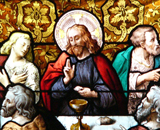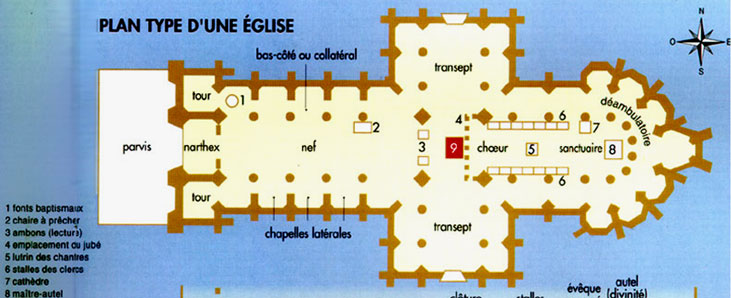Eucharist (which means action of grace or thanks to God) is the third sacrament of Christian initiation. Adult who become christian receive at first baptism, then confirmation or chrismation, then the sacrament of eucharist. They receive communion under both kinds.
Eucharist is the memory made present of Jesus' sacrifice on the cross. Eucharist also is the true presence of his body, his blood, his soul and his divinity under the sacred species of bread and wine.
Eucharist (or Mass or Holy Liturgy) is in the centre of the Christian life. Each Sunday is the Lord' Day. Christians celebrate the Eucharist to make memory and bring up to date Passover of Jesus (his passion, his death and his resurrection) and they are waiting that he comes again in the glory.
As the Hebrew eat the passover (the sacrificed lamb) in memory of the liberation of the slavery in Egypt, Jesus establishes Eucharist on the occasion of the Jewish Passover. Jesus is the Easter Lamb sacrificed to remove the sins of the world.
Jesus rose from the dead "on the first day of the week." Because it is the "first day," the day of Christ's Resurrection recalls the first creation. Because it is the "eighth day" following the Sabbath, it symbolizes the new creation ushered in by Christ's Resurrection.
For Christians it has become the first of all days, the first of all feasts, the Lord's Day or Sunday: We all gather on the day of the sun, for it is the first day [after the Jewish Sabbath, but also the first day] when God, separating matter from darkness, made the world; and on this same day Jesus Christ our Savior rose from the dead.
Matthew, Mark, Luke and Paul told the institution of Eucharist. Paul wrote: "The Lord Jesus on the night when he was betrayed took bread, and when he had given thanks, he broke it, and said, 'This is my body which is for you. Do this in remembrance of me'. In the same way also the cup, after supper, saying, 'This cup is the new covenant in my blood. Do this, as often as you drink it, in remembrance of me. For as often as you eat this bread and drink the cup, you proclaim the Lord's death until he comes'" (1Co 11, 23-26).
John also reports other words of Jesus: "Unless you eat the flesh of the Son of man and drink his blood, you have no life in you; he who eats my flesh and drinks my blood has eternal life, and I will raise him up at the last day. For my flesh is food indeed, and my blood is drink indeed. He who eats my flesh and drinks my blood abides in me, and I in him" (6, 53-58).
Several writings of the first centuries describe the rites of the eucharist at the first Christians. Christians indeed celebrate the eucharist every day and almost everywhere in the world for 2000 years. A church dating the third century has just been found in Israel, in Meggido. The mosaic represents the symbol of the fish used by the first Christians during the persecutions, because letters forming the word fish in Greek (Ichtus) correspond to "Jesus Christ, of God, Son, Savior".

